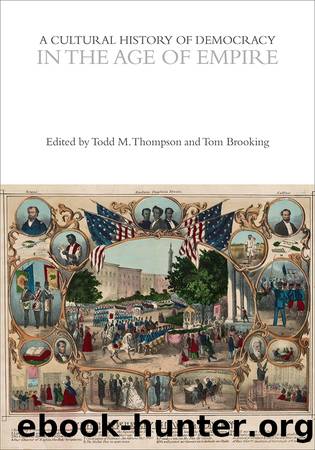A Cultural History of Democracy in the Age of Empire by Tom Brooking;Todd M. Thompson;

Author:Tom Brooking;Todd M. Thompson;
Language: eng
Format: epub, pdf
Publisher: Bloomsbury UK
FIGURE 6.4 Metamorphic anti-suffrage card, âIf the Suffragettes Succeed,â 1900. Photograph by Ken Florey Suffrage Collection/Gado/Getty Images.
WAR AND THE SEXUAL DIVISION OF THE WORLD
The link between military service and citizenship forged during the French Revolution had encompassed womenâs participation, but was masculinized across the nineteenth century. Women participated as citizens in the revolution, joining mass demonstrations, publishing pamphlets, making speeches, taking up arms, and claiming to be part of the sovereign people (Applewhite and Levy 1990). Yet male revolutionaries ultimately fastened forms of political citizenship exclusively to their own gender, a connection reaffirmed through the valorization of menâs blood sacrifice during the Prussian Wars of Liberation (1813â15) (Hagemann 2004). Women were thus doubly disadvantaged by their gender: excluded from battle and from the vote, they fought to make opportunities to demonstrate their fitness for citizenship (Nye 2007).
The First World War, or The Great War, as contemporaries called it, created multiple opportunities for women to act as citizens, for it created new spaces in which they could contribute to the nation. Women worked as munitions workers, agricultural laborers, ambulance drivers, and volunteer nurses, to name only a few of the positions they assumed during the conflict. The appearance of women in what had been traditionally menâs work was met with alarm at the time. Contemporaries noted that the large-scale enlistment of men in the armed forces created a âfeminizedâ society, with women taking on menâs roles (Boak 2013). In response, governments took efforts to reassure men that the transformation of labor necessitated by the war would be for the duration of the war only. Yet, the very nature of the First World War as a âtotal warâ guaranteed that traditional distinctions between masculine and feminine could not be maintained.
For the Great War was the first global and total war. As a total war, it challenged traditional dichotomies between masculine and feminine, battlefield and home front, because it demanded the mobilization of entire societies for its execution. The Great War was the first in Europe to mobilize millions of women for civilian and military work, in support roles, such as nursing, munitions-making, and agriculture, and as military auxiliaries in combat. Women working in the defense industries effectively complemented and expanded the reach of the male armed forces. Employed or not, women civilians dealt with the food shortages, rationing, evacuation, and bombings that became a part of civiliansâ and soldiersâ experience of war. And as men of color and those from the European colonies enlisted or were conscripted into the armed services, they also participated in the war in ways that would later enable them to claim political rights (Jensen 2017).
At the same time, the Great War reified the importance of female reproductive roles and male military contributions to citizenship. Governmentsâ insistence on the opposition of home front versus battlefront attempted to attribute a specific gender to the model citizen: masculinity. But while contemporaries conceptualized the war as split between fronts, the necessities of total war challenged that dichotomy at every turn. Propaganda
Download
A Cultural History of Democracy in the Age of Empire by Tom Brooking;Todd M. Thompson;.pdf
This site does not store any files on its server. We only index and link to content provided by other sites. Please contact the content providers to delete copyright contents if any and email us, we'll remove relevant links or contents immediately.
Collaborating with Parents for Early School Success : The Achieving-Behaving-Caring Program by Stephanie H. McConaughy; Pam Kay; Julie A. Welkowitz; Kim Hewitt; Martha D. Fitzgerald(906)
Entrepreneurship Education and Training: The Issue of Effectiveness by Colette Henry Frances Hill Claire Leitch(673)
Adding Value to Policy Analysis and Advice by Claudia Scott; Karen Baehler(499)
Materializing the Middle Passage by Jane Webster;(498)
Race and American Political Development by unknow(490)
American Government and Politics Today by Steffen W. Schmidt Mack C. Shelley Barbara A. Bardes(488)
Sociological Perspectives of Health and Illness by Constantinos N. Phellas(487)
Human and Global Security : An Exploration of Terms by Peter Stoett(474)
Control Of Oil - Hardback by Kayal(471)
The Disappearance of Rituals: A Topology of the Present by Byung-Chul Han(410)
The Catholic Church and European State Formation, AD 1000-1500 by Jørgen Møller(403)
Advances in Child Development and Behavior, Volume 37 by Patricia J. Bauer(403)
The World According to China by Elizabeth C. Economy(387)
Theories of Counseling and Psychotherapy: A Case Approach by Nancy L. Murdock(381)
Left Is Not Woke by Susan Neiman(371)
Application of classical statistics, logratio transformation and multifractal approaches to delineate geochemical anomalies in the Zarshuran gold district, NW Iran by unknow(371)
Cross-Cultural Child Development for Social Workers by Lena Robinson(359)
Turkey's Relations with the West and the Turkic Republics: The Rise and Fall of the Turkish Model by Idris Bal(356)
Japan's Ainu Minority in Tokyo by Mark K. Watson(341)
